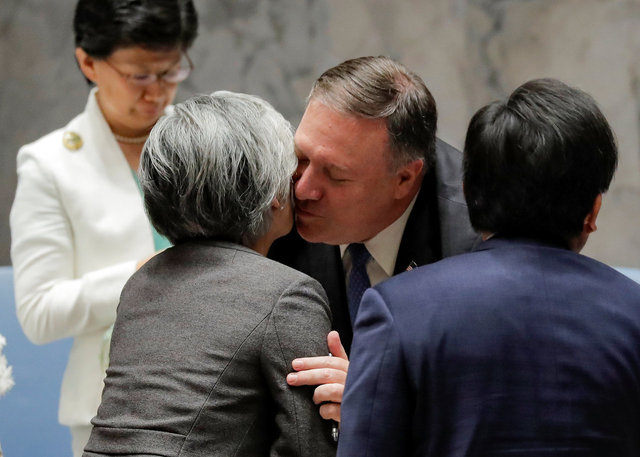 |
|
US Secretary of State Mike Pompeo with South Korean Foreign Minister Kang Kyung-wha at the UN Security Council meeting for member nation ministers on Sept. 27 in New York. (Reuters)
|
Seoul calls for more room to proceed with inter-Korean cooperation projects
Exemptions to international sanctions on North could be applied “flexibly in short-term, tactical areas according to the situation,” a senior South Korean government official said on Sept. 28. The message was a call from Seoul to maintain the broader framework of North Korea sanctions while allowing some exemptions as needed for inter-Korean exchange and cooperation. Meeting with South Korean correspondents in New York that day, the senior official responded to a question on Seoul’s position regarding Washington’s emphasis on keeping North Korea sanctions in place. “The position that the sanctions framework is to be kept in place until we are confident about North Korea’s complete denuclearization is the shared position of the US and South Korea governments,” the official replied. “But while we are working to proceed in the same direction in the broader framework, it is not realistic to proceed mechanically at the same speed,” the official added. “Rather than the loosening of sanctions, our administration is requesting exemptions or exceptions to sanctions for areas necessary to carry out the inter-Korean cooperation efforts specified in the Apr. 27 Panmunjom Declaration.” The same official said that the “resumption of Kaesong Industrial Complex [operations] and tourism at Mt. Kumgang would be possible once the international community is satisfied with North Korea’s denuclearization measures and sanctions have been lifted.” “Things like surveys in connection with railway and road projects or the establishment of a permanent office for divided family reunions are unrelated to sanctions, as they do not offer economic benefits to North Korea.” Shutdown of Yongbyon complex would much more than “step-by-step” approach On the issue of North Korea-US denuclearization talks, the official said, “We do not anticipate that nuclear reporting and verification will follow a ‘step-by-step’ approach.” “For example, if North Korea shuts down its nuclear facilities at Yongbyon, they would be dismantling a huge portion,” the official added. “If North Korea shuts down its Yongbyon nuclear facilities for certain under observation by the IAEA and inspectors, it would result in that much more trust between North Korea and the US, which could be used as a basis for a process of adopting other measures.” The official’s remarks were read as suggesting that substantial initial steps such as dismantlement of the Yongbyon facilities – as opposed to reporting of North Korea’s full nuclear capabilities – could provide the starting point and impetus for future North Korea-US talks. In a Sept. 21 interview with the KBS network, Minister of Foreign Affairs Kang Kyung-wha said, “The traditional denuclearization process and sequence could change.” “We need inspections and a verification process, but I think the question of whether that has to come in the early stages could be a bit different this time,” she added. Political significance of end-of-war declaration The same senior official also said the South Korean and US governments were in agreement on a declaration ending the Korean War – which North Korea has demanded as a means of improving its ties with the US and ensuring its regime’s security – being a “political declaration.” “After mention of an end-of-war declaration was included in the Panmunjom Declaration, it looks like the US needed some time to consider the impact it would have in a legal sense on the armistice system,” the official said. “But now the US amply understands our government’s position,” the official added, suggesting the US shares the view that an end-of-war declaration would hold no implications in terms of the withdrawal of US Forces Korea, the standing of the UN Command, or weakening of the South Korea-US alliance. Speaking on the same issue, another government official said, “North Korea and the US need to agree on the weight they attach to Yongbyon’s denuclearization and an end-of-war declaration. They have to put everything on the negotiating table and work on connecting them.” For this reason, the first senior official said that US Secretary of State Mike Pompeo’s scheduled Pyongyang visit next month “will be the most important event on the schedule going ahead.” Meanwhile, the senior official reported that Kang had had a closed-door meeting with Pompeo on the afternoon of Sept. 26 shortly after Pompeo’s meeting with North Korean Foreign Minister Ri Yong-ho. By Hwang Joon-bum, Washington correspondent Please direct comments or questions to [english@hani.co.kr]





